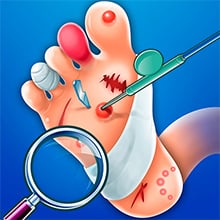
Surgery Games
Discover 10 amazing surgery games. Play for free and have fun!
About Surgery Games
What Are Surgery Games?
Surgery games are a type of video game or mobile app that simulates medical procedures, specifically surgical surgeries. These games allow players to take on the role of a surgeon, executing a wide range of medical duties like suturing wounds, making incisions, restoring organs, and even more advanced procedures like transplants. They frequently seek to imitate the high-pressure environment of an operating room, which necessitates precision, quick thinking, and attention to detail. Surgery games can range from very realistic simulations used for instructional purposes to more informal, arcade-style games with a lighthearted, exaggerated take on medicine.
Surgery games, especially more instructional versions, can be excellent tools for those interested in medicine by providing basic insights into anatomy and the methods involved in various surgeries. While they lack the depth and precision of true medical training, they can pique interest and provide an engaging introduction to healthcare practices. More informal or entertainment-oriented versions frequently place an emphasis on speed and efficiency, with simplified medical procedures aimed to entertain rather than educate. These games appeal to a wide range of people, including those interested in medical science and those looking for a unique and engaging gaming experience.
Benefits Of Surgery Games
Surgery games have various advantages, especially in educational and cognitive development environments. One of the most significant advantages is that they can spark an early interest in medical and healthcare. By imitating real-life surgical procedures, these games allow players, particularly children, to understand the field of surgery in an interactive and engaging manner. Players learn the basics of human anatomy and medical operations, which helps to demystify the surgical profession. Surgery games can provide students and prospective medical professionals with an informal exposure to concepts they would encounter in official training, motivating them to learn more about the discipline.
Another key benefit of surgery games is their capacity to improve cognitive skills. Players must traverse the complexities of simulated procedures in these games, which frequently involve precision, quick decision-making, and problem-solving skills. Players must acquire hand-eye coordination, fine motor skills, and attention to detail while patching wounds, making incisions, or using virtual medical instruments in the game. These abilities can lead to increased focus and cognitive flexibility, which are useful in both educational settings and daily life.
In addition to educational and cognitive benefits, surgery games can also help reduce anxiety about medical procedures for some people. By giving players a sense of control and familiarity with surgical environments, these games can alleviate fears related to surgeries or medical settings. This could be particularly useful for children or individuals with a fear of hospitals, allowing them to face these scenarios in a safe and entertaining context.
How To Play Surgery Games
The encounter usually starts with choosing a patient or a certain surgical technique. Depending on the game, this could range from simple duties like healing minor injuries to more difficult procedures like organ transplants or heart surgery. The game frequently includes background information on the patient's health, allowing you to comprehend what has to be done. This is especially significant in more realistic simulations, when a complete comprehension of the method is required for success.
Once a patient has been picked, the game will walk you through the surgical procedure step by step. These instructions may be displayed as text on the screen or as interactive tutorials. Following the directions is critical, especially for gamers who may be unfamiliar with medical procedures. For example, the game may advise you to make an incision in a certain area of your body, clean the wound, or restore damaged tissues. The instructions ensure that gamers, regardless of skill level, can effectively carry out the procedure without real-life medical knowledge.
During the procedure, players must use various virtual medical tools, such as scalpels, forceps, needles, and sutures. These tools need to be selected and applied with precision to specific areas on the patient's body. Precision is key in surgery games, especially in more advanced simulations where any mistake can lead to complications. This aspect of gameplay tests players' hand-eye coordination and attention to detail, making the experience both challenging and rewarding.
As the surgery progresses, players are typically expected to monitor the patient's vital signs, ensuring that their health remains steady. Many surgery games contain indicators like heart rate, blood pressure, and a general health bar to monitor the patient's progress throughout the procedure. In other situations, players may be required to respond to emergencies, such as a sudden decline in vitals, adding a layer of real-time problem solving to the game.
After completing the necessary surgical steps, players must close up the patient. This typically involves suturing the incisions, cleaning the area, and applying bandages or aftercare. At the end of the operation, the game may grade the player's performance based on speed, accuracy, and how well the patient recovers. Success often leads to unlocking new levels or more challenging procedures, allowing players to test their skills further.










